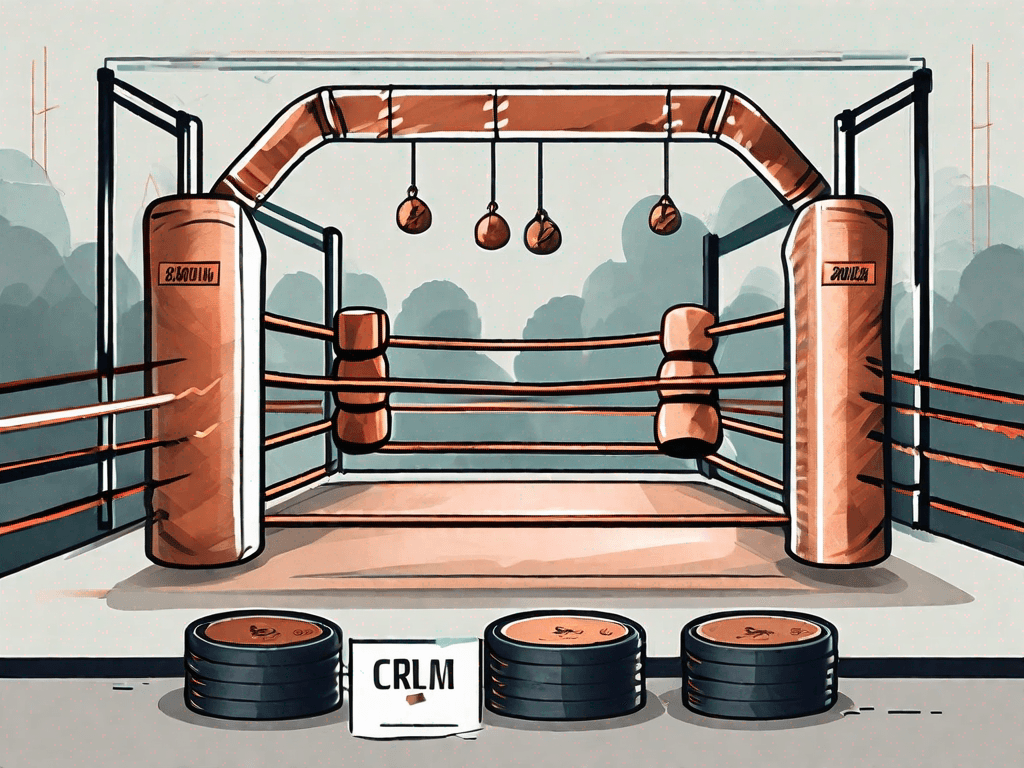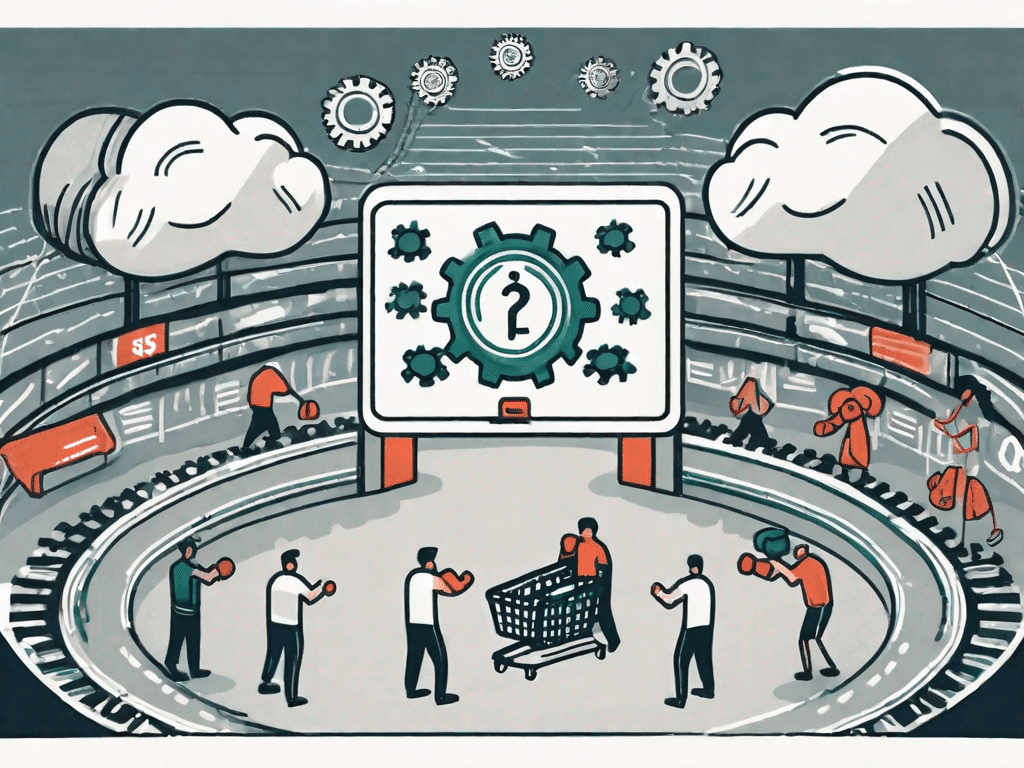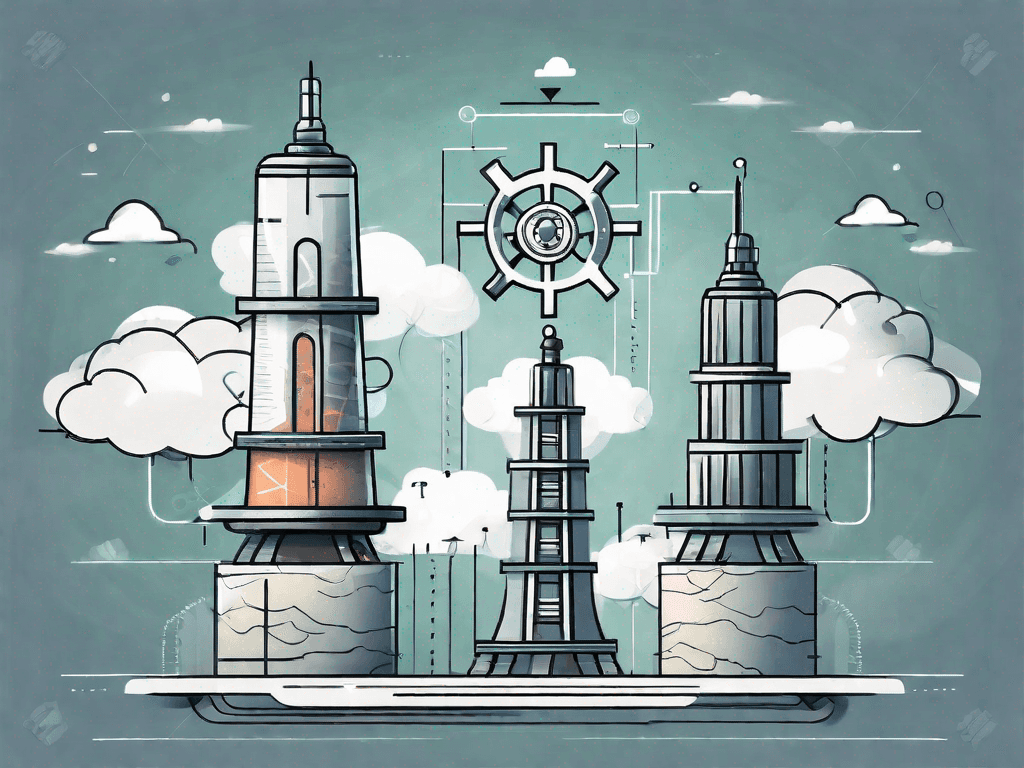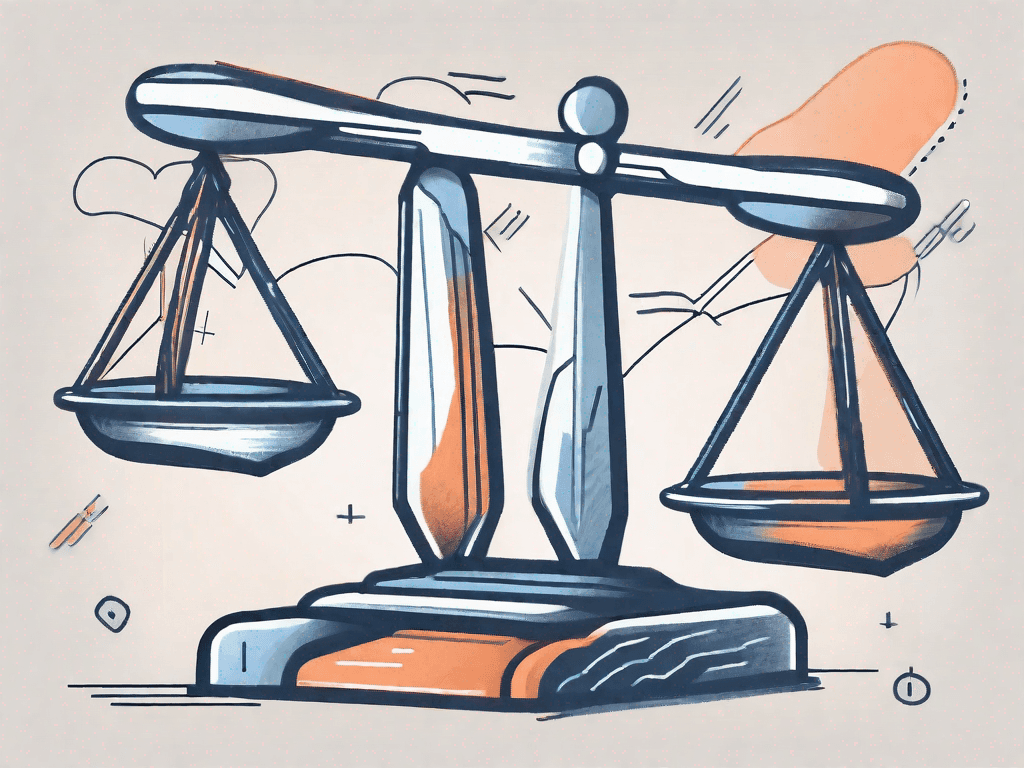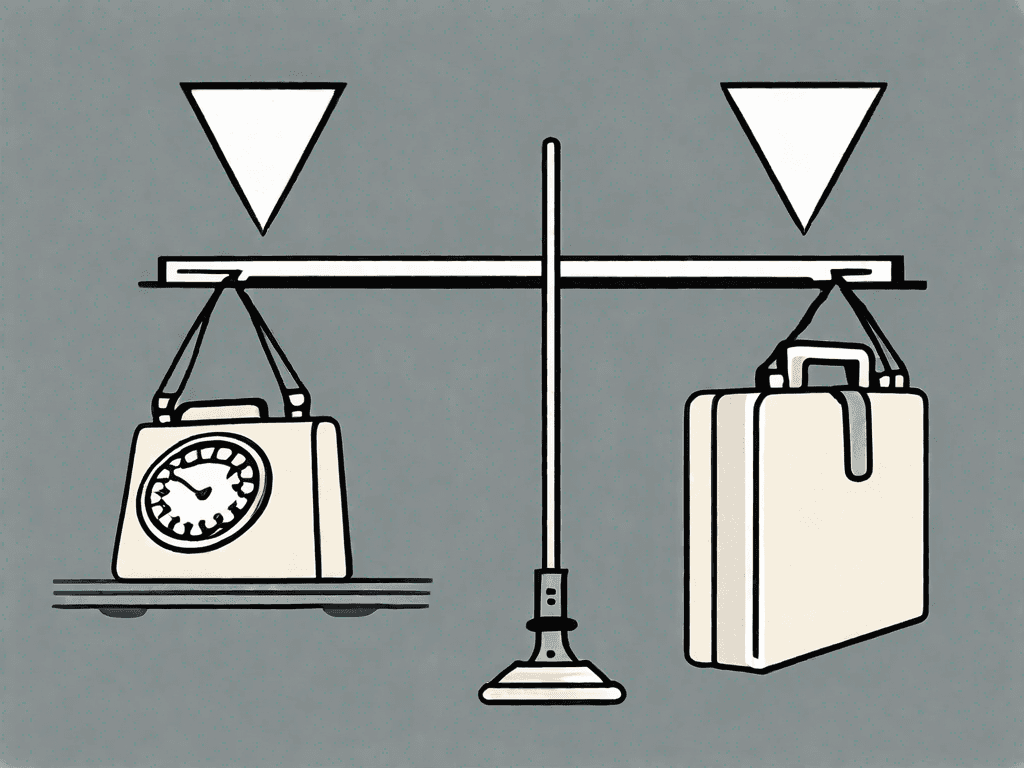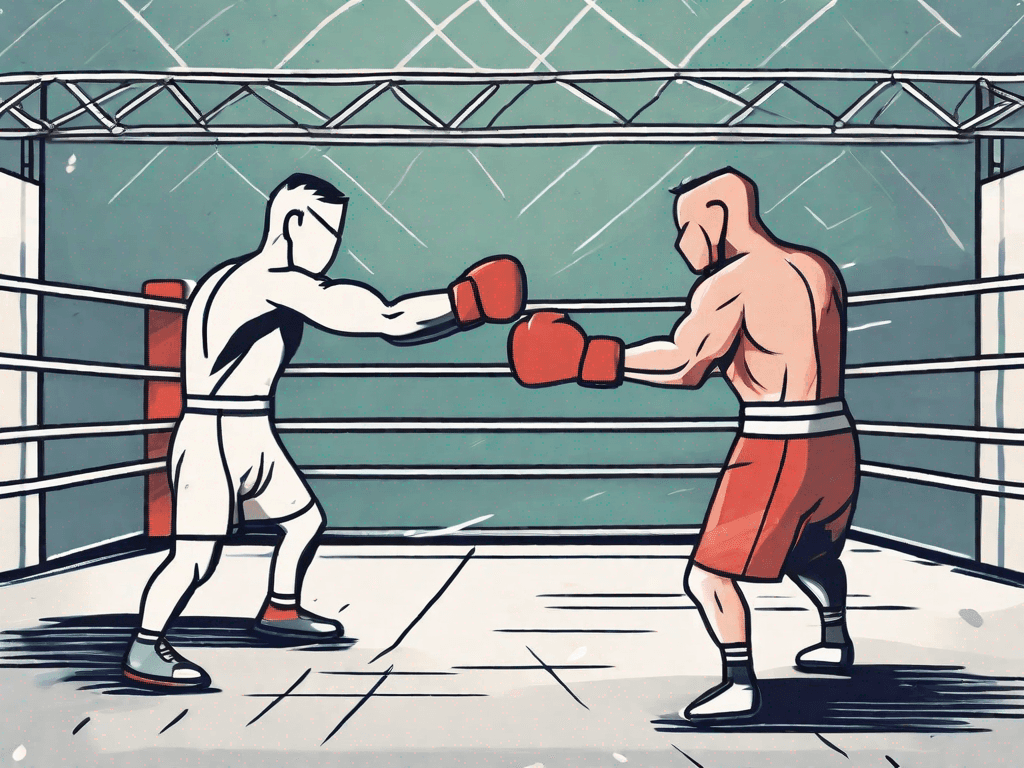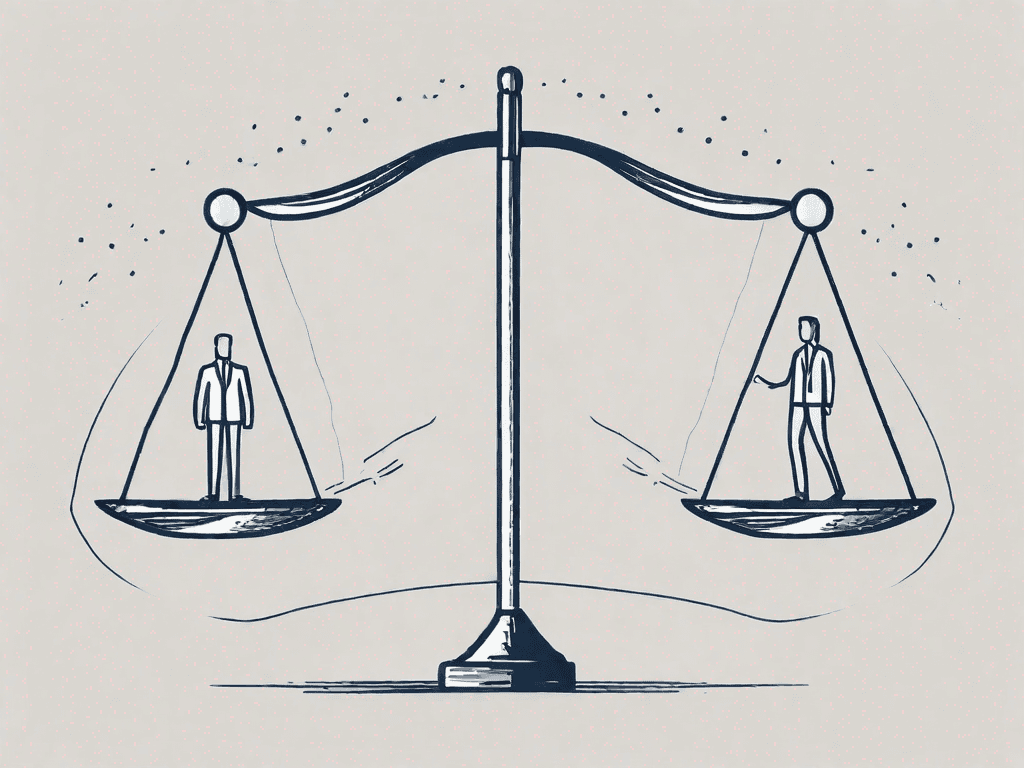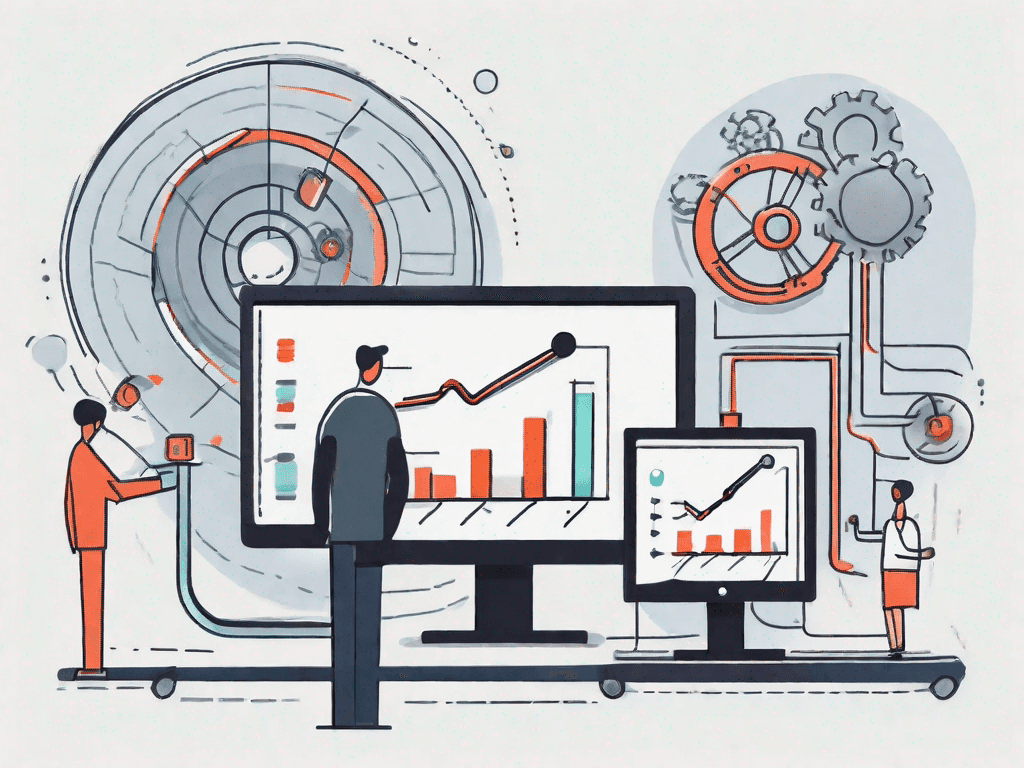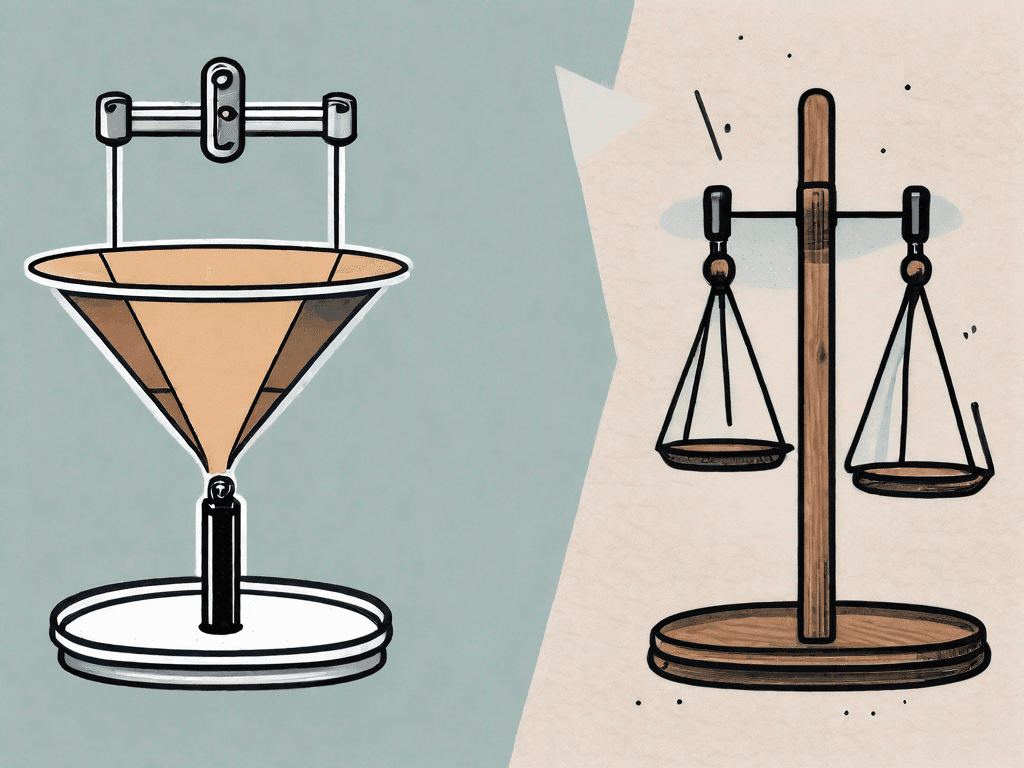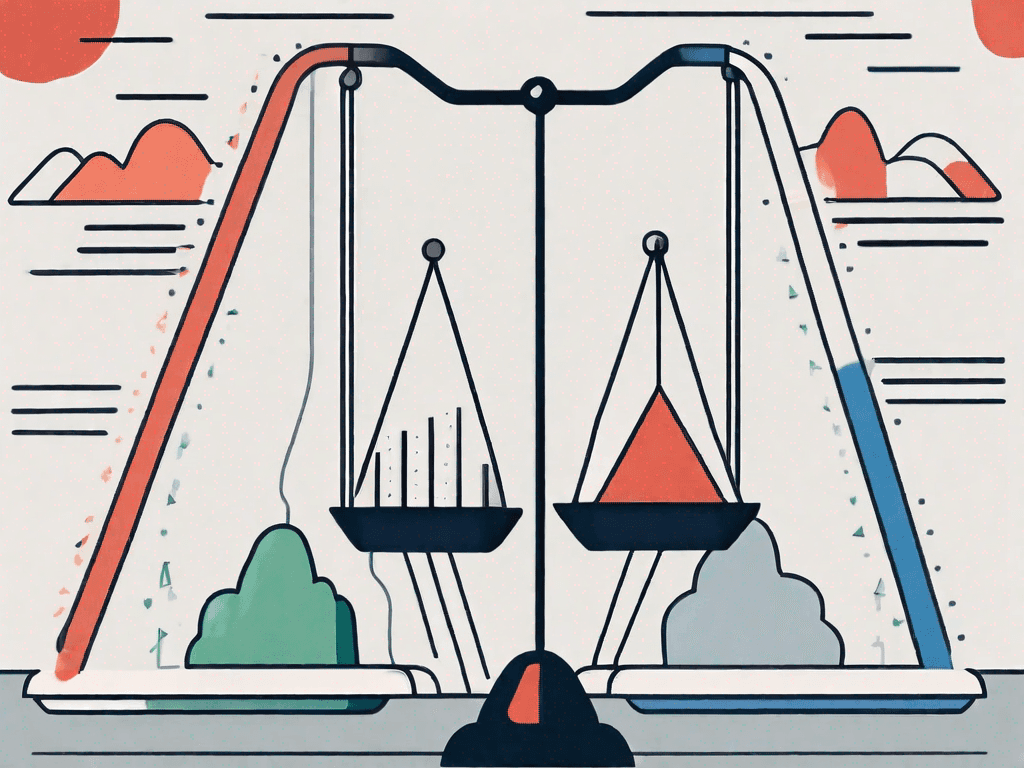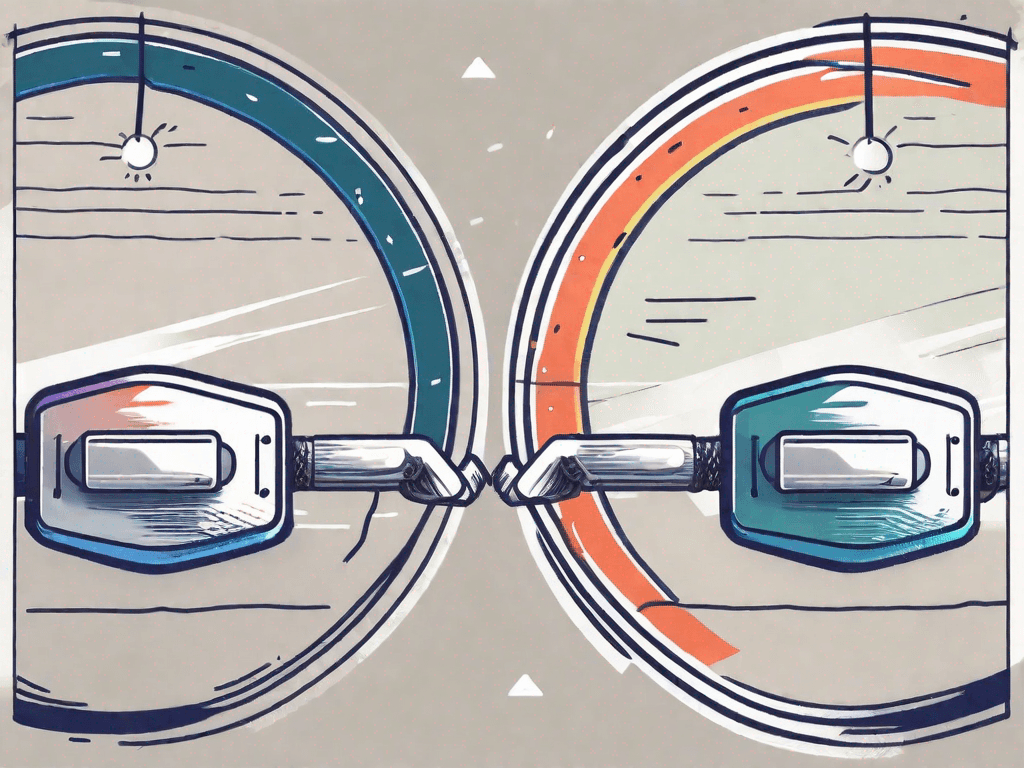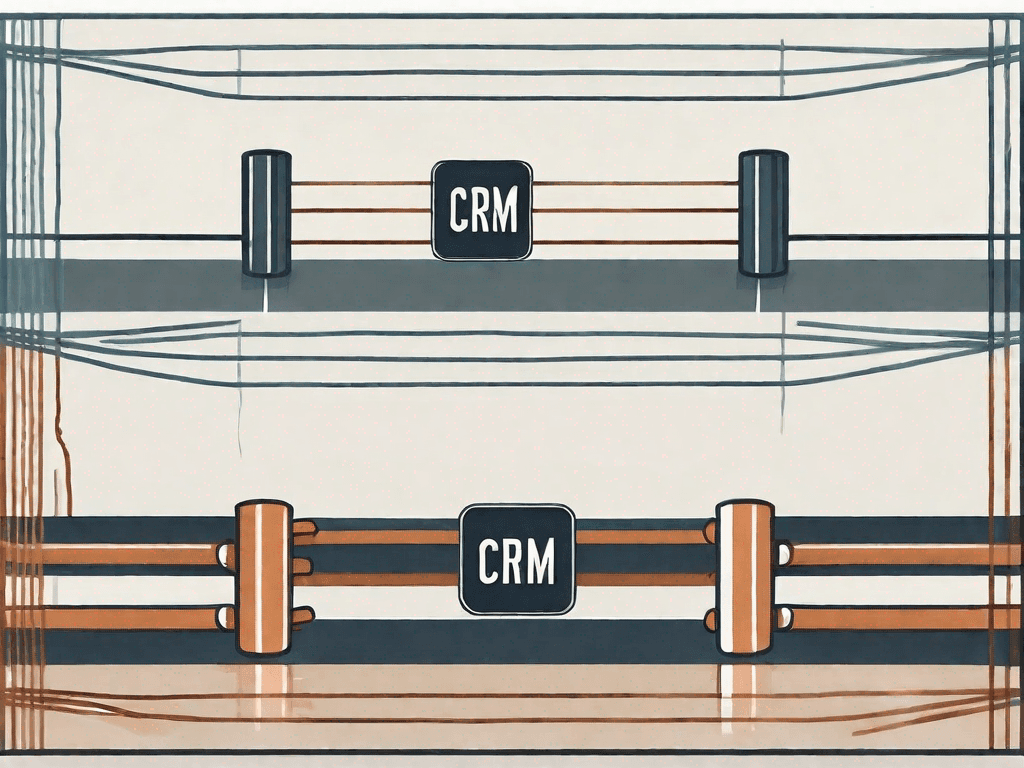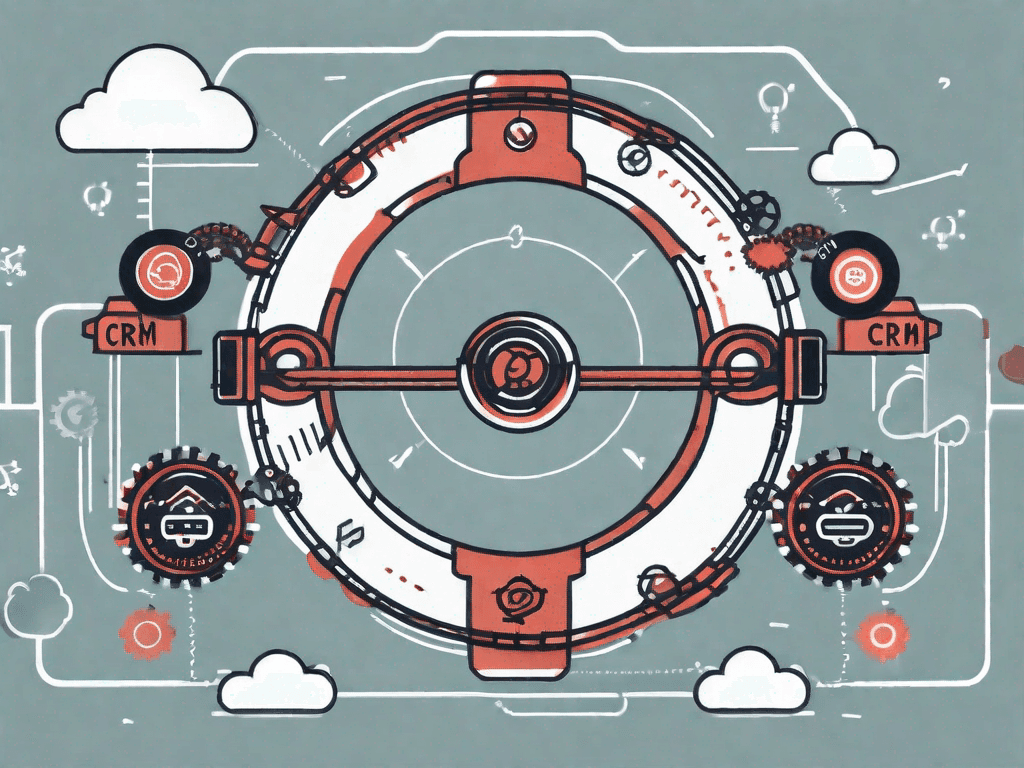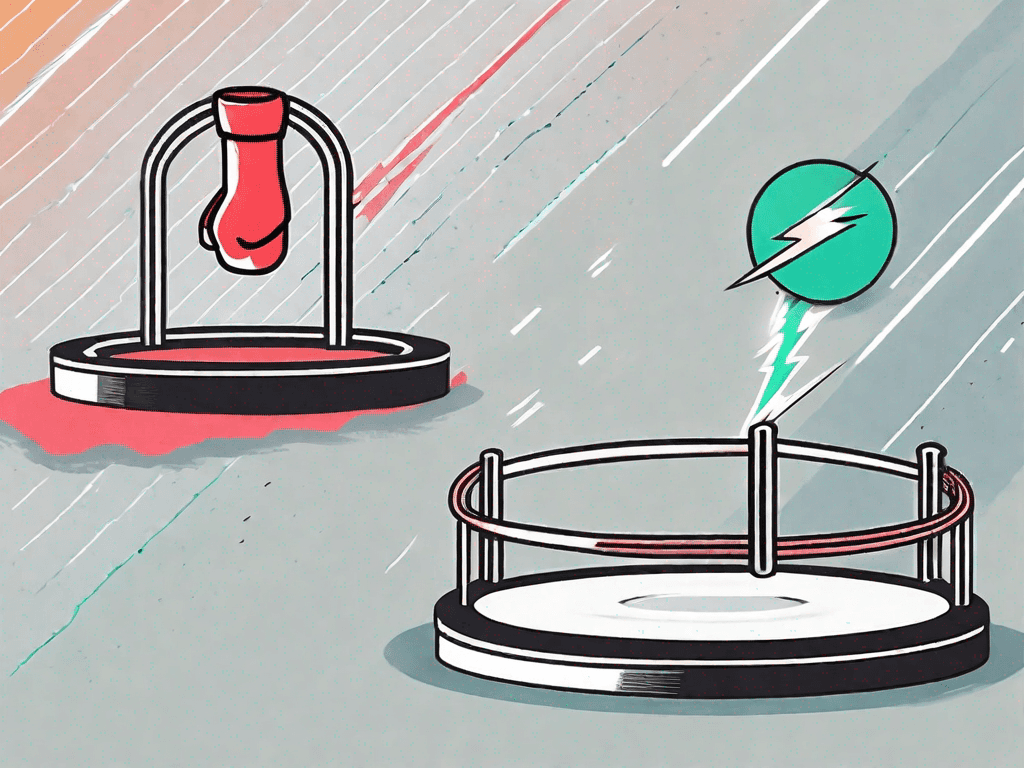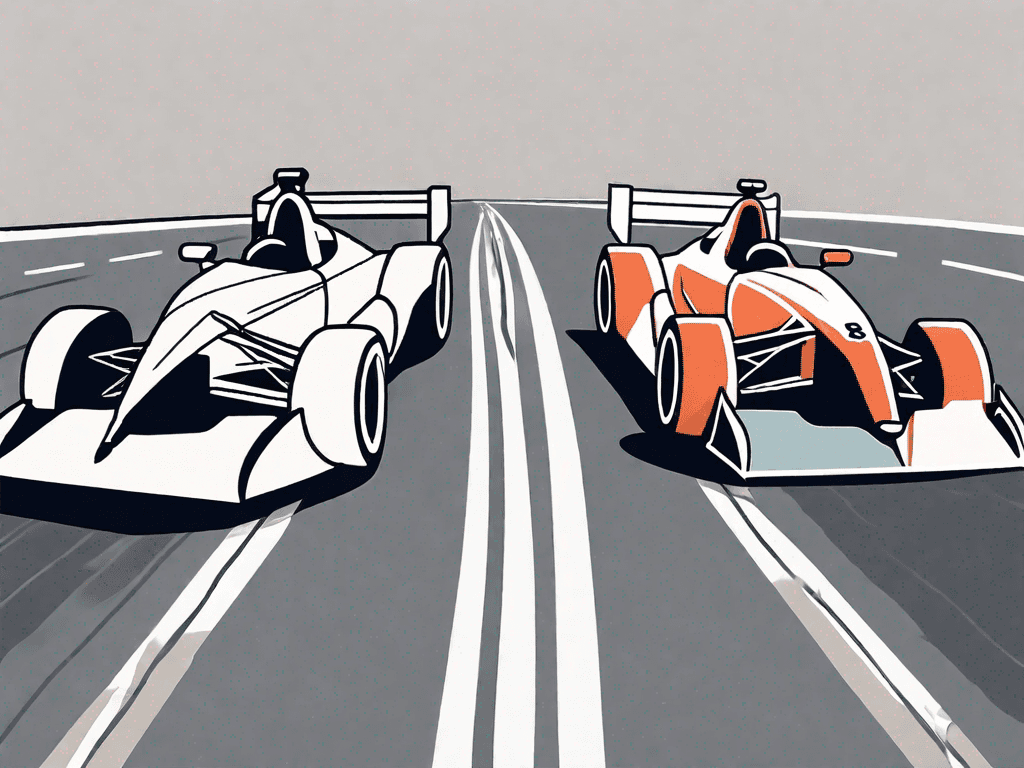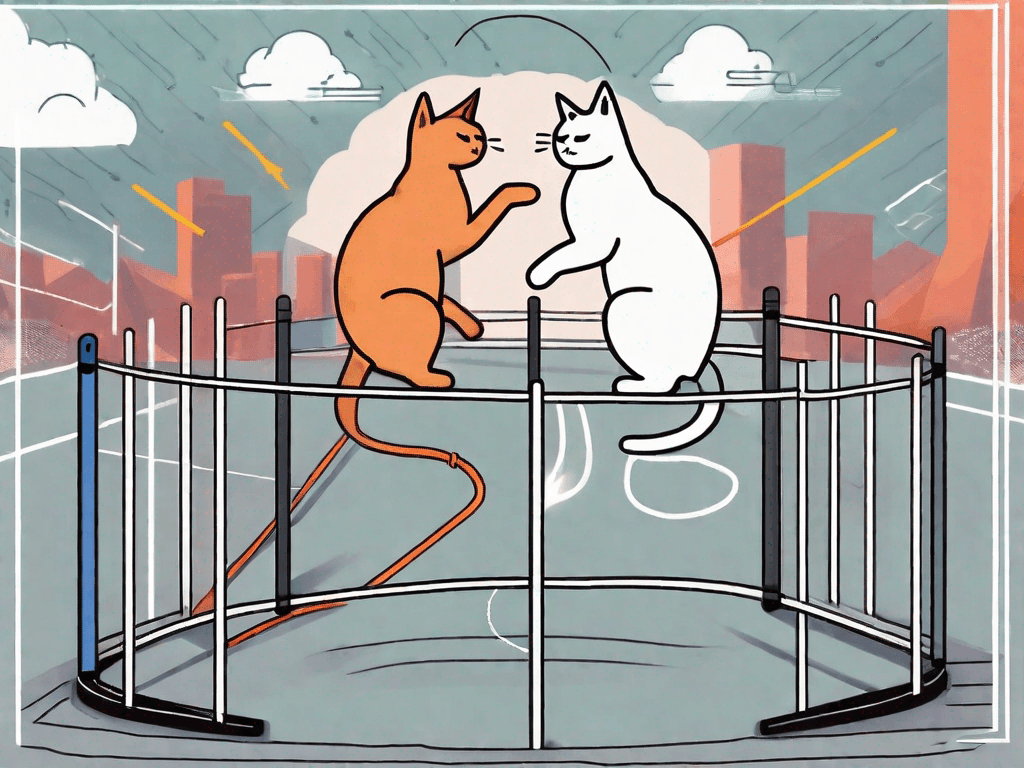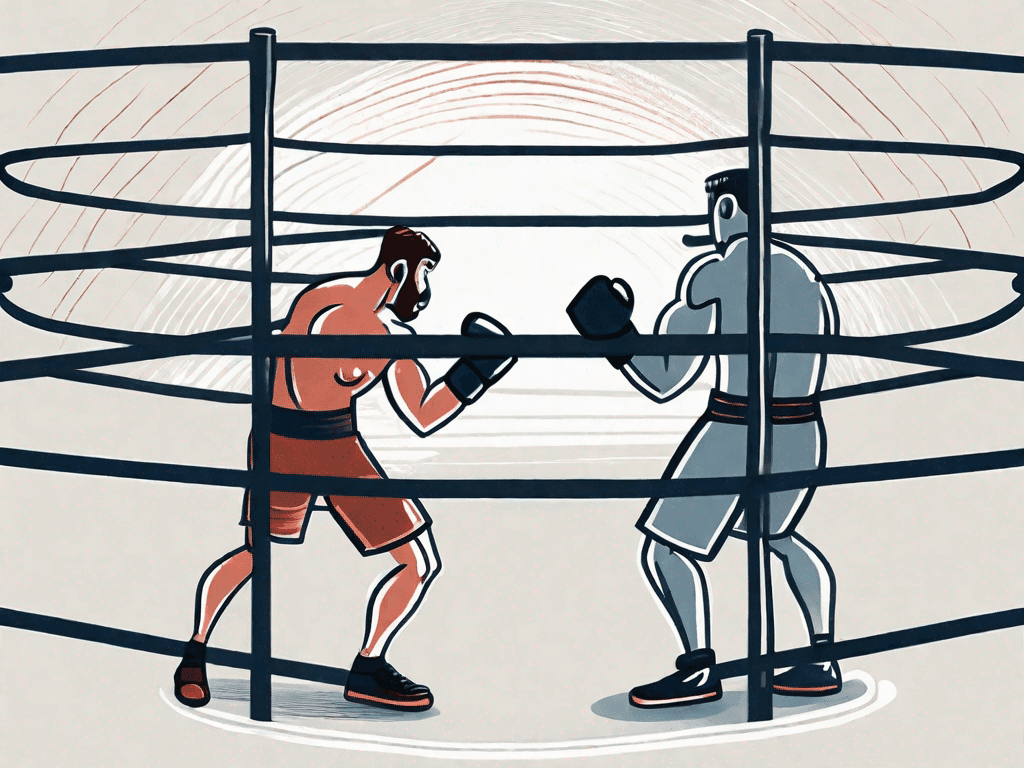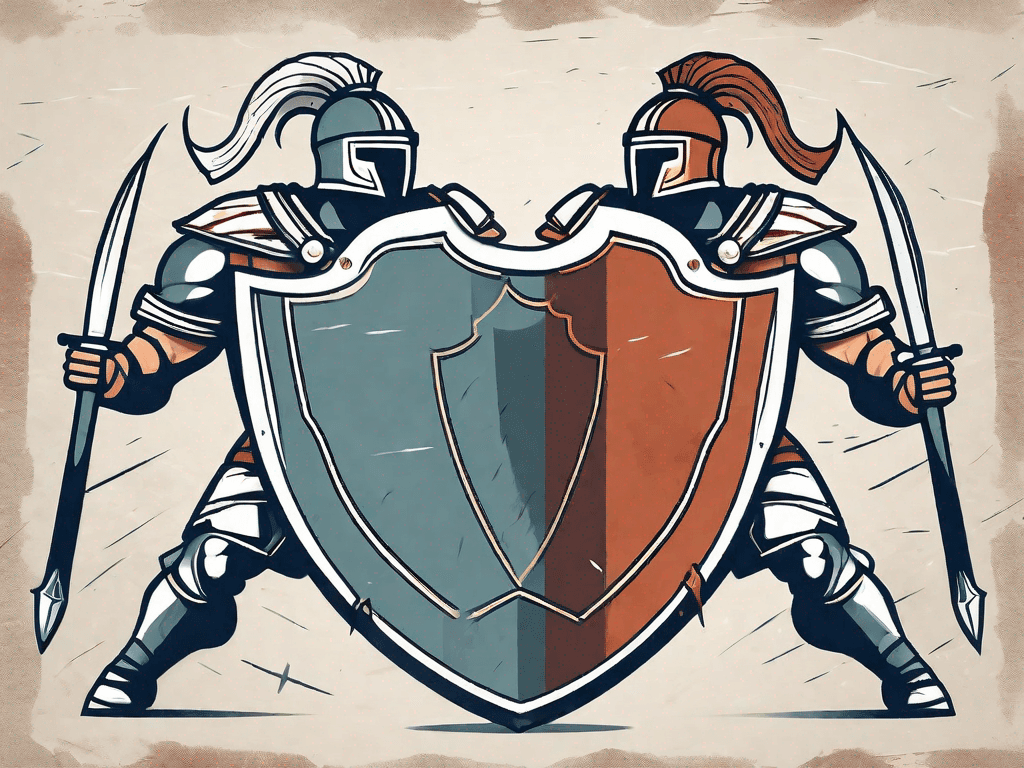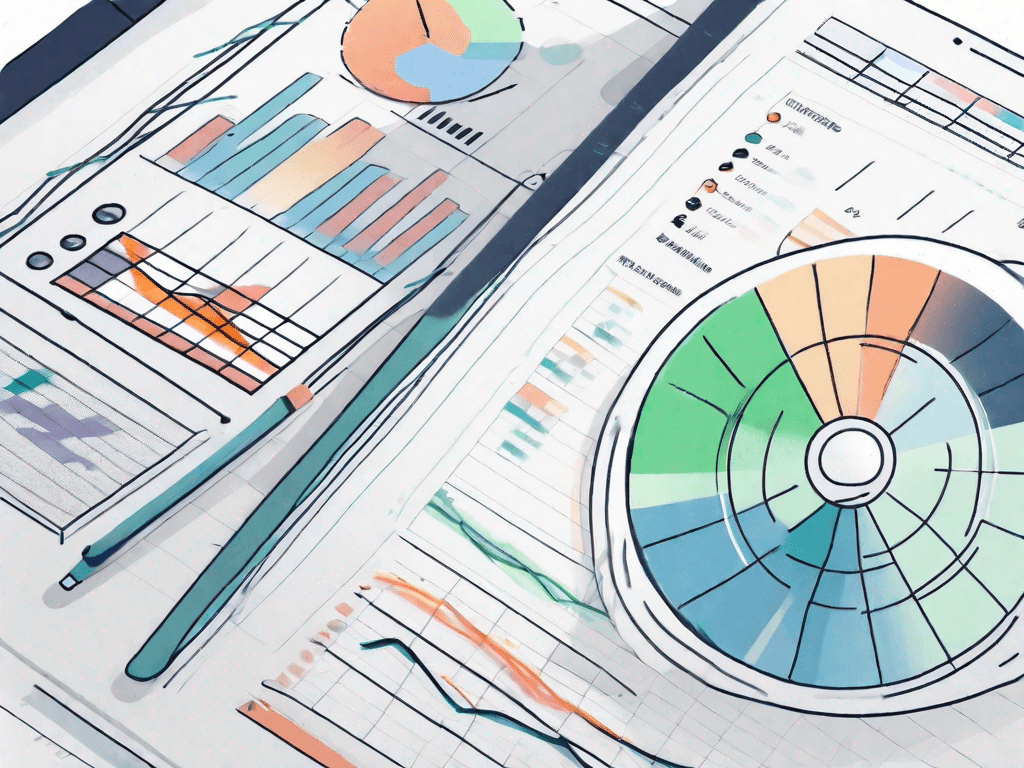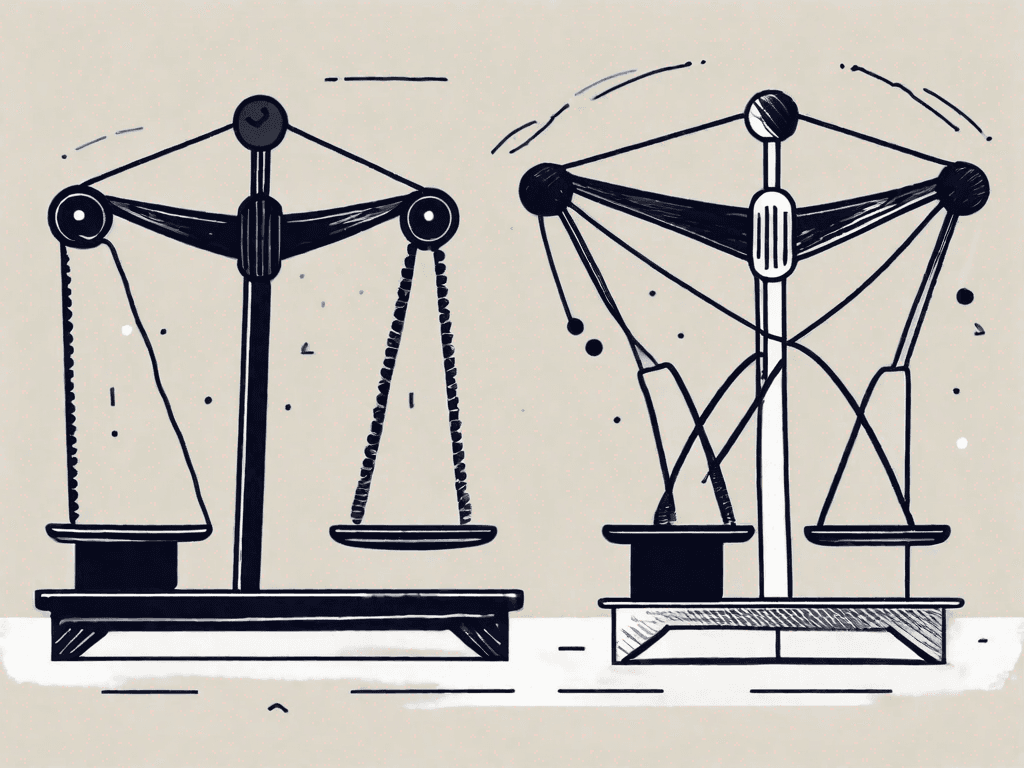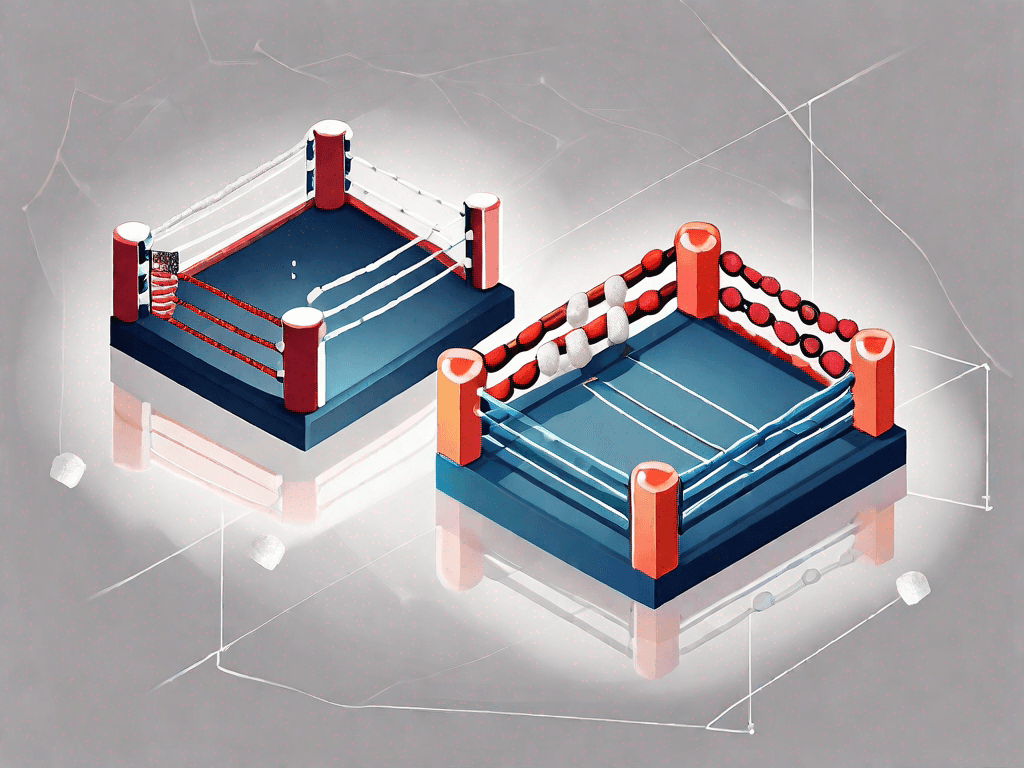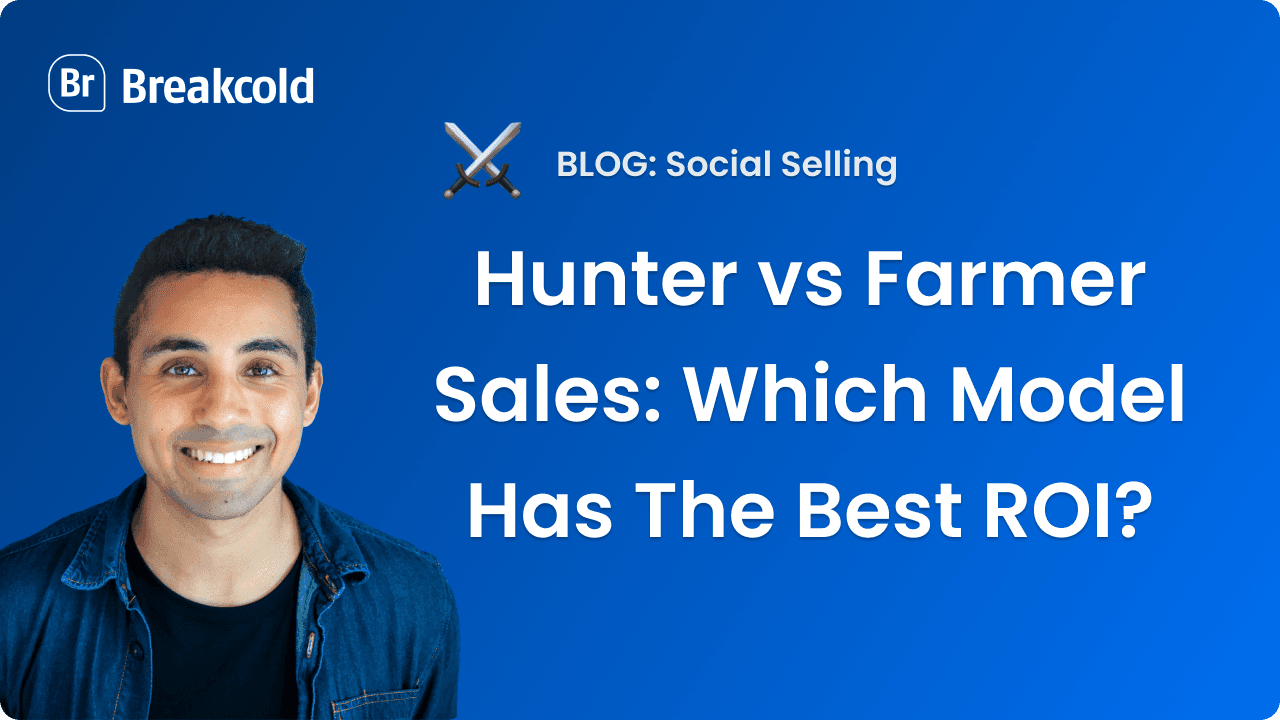
1°) What is the difference between the Hunter vs Farmer sales model?
The difference explained
The difference between Hunter vs Farmer sales is that the Hunter sales model is dedicated to generate leads while the Farmer method is about getting the most out of the current warm prospects and existing clients.
The salespeople doing Hunter sales are called "Hunters" while the ones doing Farmer sales are called "Farmers".
Long story short, being a Hunter means that you are obsessed about generating more leads and filling the sales pipeline with qualified leads. On the other side, a Farmer finds happiness in the closing process, renewing contrats and in revenue expansion.
Consequently, Hunter sales is mostly about Outbound Sales and Farmer sales is mostly about Inside Sales.
Both sales prospecting methods have their advantages and disadvantages (I explain it below).
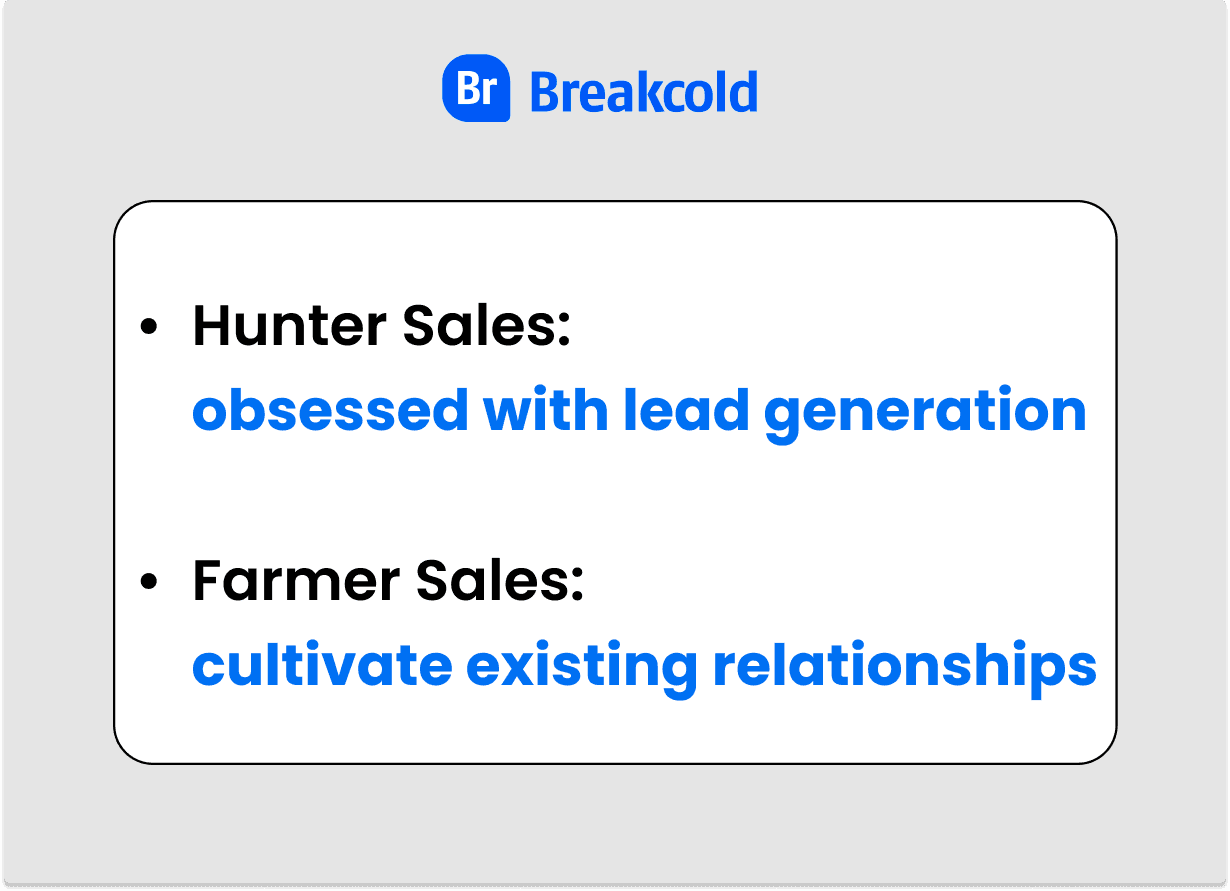
Hunter Sales vs Farmer Sales explained
What skills are required in Hunter Sales?
In Hunter Sales, you will face many rejections. In some instances, people might even insult you. That's why rejection tolerance is arguably the strongest skill of a Hunter.
A Hunter should also be resilient, it takes many follow up emails to get a positive or negative answer from a prospect. If you've been given a limited number of prospects to reach out, you need to be patient.
Hunter sales should also be able to:
use cold email and social selling softwares
use LinkedIn to network and generate leads
build a personal brand to accelerate the lead generation process
If I were to describe the personality of a Hunter, it would be an extravert who never gives up to succeed.
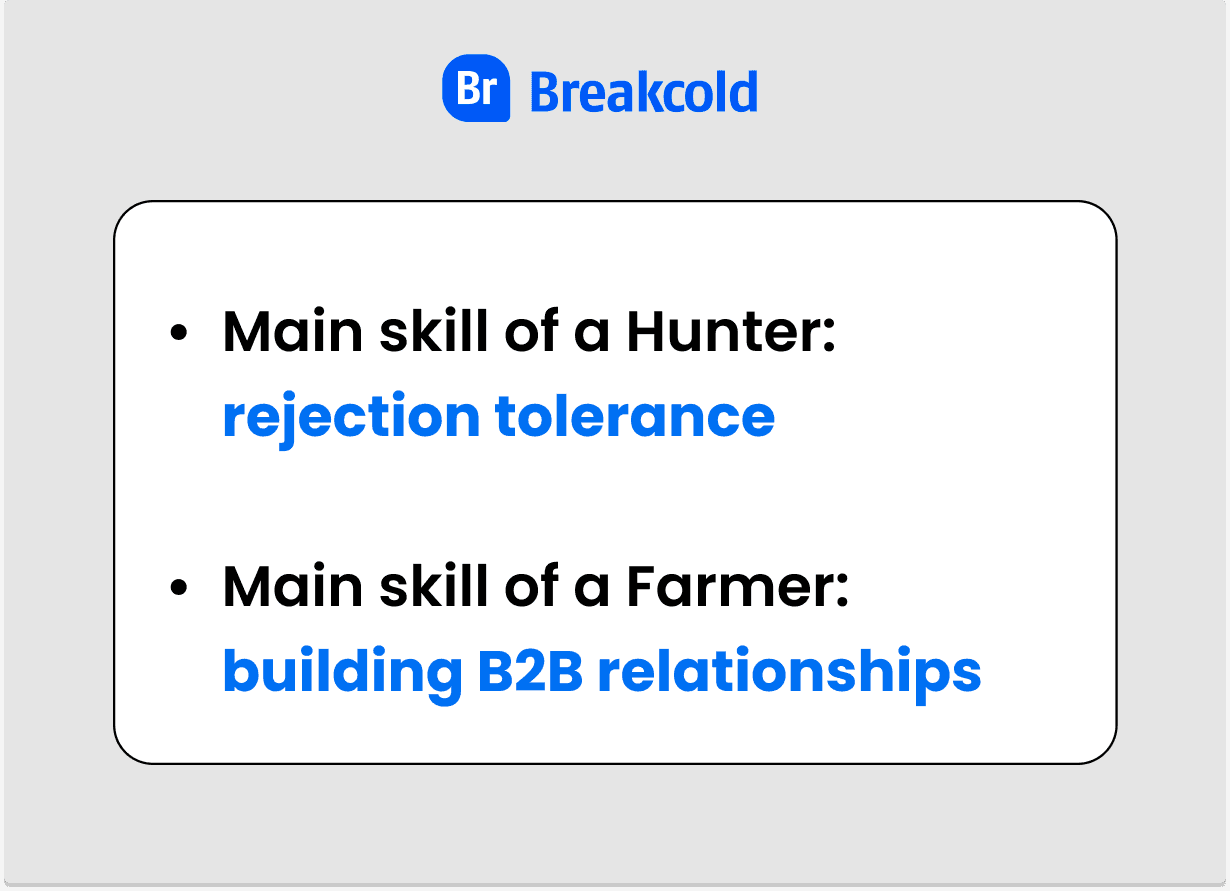
Main skill of a Hunter vs main skill of a Farmer
What skills are required in Farmer sales?
In Farmer Sales, you play in a more comfortable zone because the leads are qualified, you "only" have to close them. But the responsibility is big because if you fail to close, the fault is on you.
A Farmer should be patient as sales cycles can be long and some sales will take 1 week while others will take 1 year. The main role of a Farmer is to build B2B relationships with its existing clients and warm prospects. Therefore a Farmer must be friendly and should be good at bonding with different types of people.
If I were to describe the personality of a Hunter, it would be an introvert who thrives talking with his close friends.
In a sales organization, who is usually a Hunter or a Farmer?
In SMBs and early-stage startups, any sales team members can be a Farmer or a Hunter, even the Co-Founders.
However, when if you work in an enterprise environment, you're more likely to have salespeople who specialize in a method or another.
In this scenario, people doing Hunter sales will be:
Business Development Representatives (BDRs) whose role is to send many cold emails and/or cold calling tons of prospects every single day
Sales Development Representatives (SDRs) whose role will be similar to BDRs in certain organizations but they can have some inside sales duties. However these duties are often to qualify the leads because not every leads that are generated are qualified.
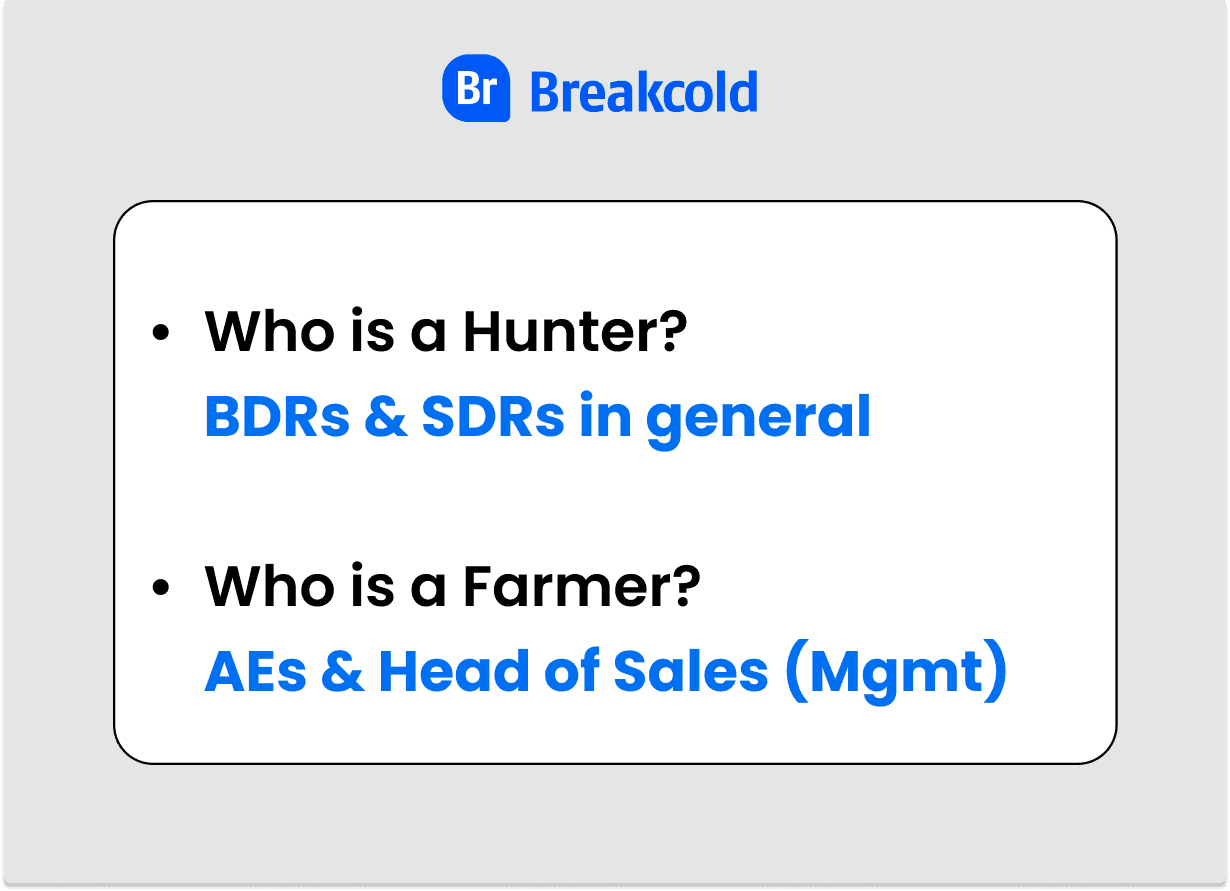
Who is a Hunter vs who is a Farmer?
When it comes to people executing the Farmer sales method, it will be:
Account Executives (AEs). Their role is mostly to take care of current customers and making sure that the most qualified leads become customers.
Head of Sales. Beyond managing their sales team, Head of sales in big organizations will take care of the most valuable clients and qualified prospects.
Because of this hierarchy, it seems that Farmer sales is a role that is suited for higher sales executives rather than for junior roles. That's why so many SDRs and BDRs want to become AEs before eventually becoming Head of Sales.
What sales tools are favored by Hunters vs Farmers salespeople?
Hunters need to generate leads constantly, if possible at scale, therefore they love the different kind of softwares:
sales automation softwares
sales engagement softwares
cold calling softwares
cold email softwares
email finder softwares
Farmers need to close deals and build B2B relationships, therefore they love this kind of softwares:
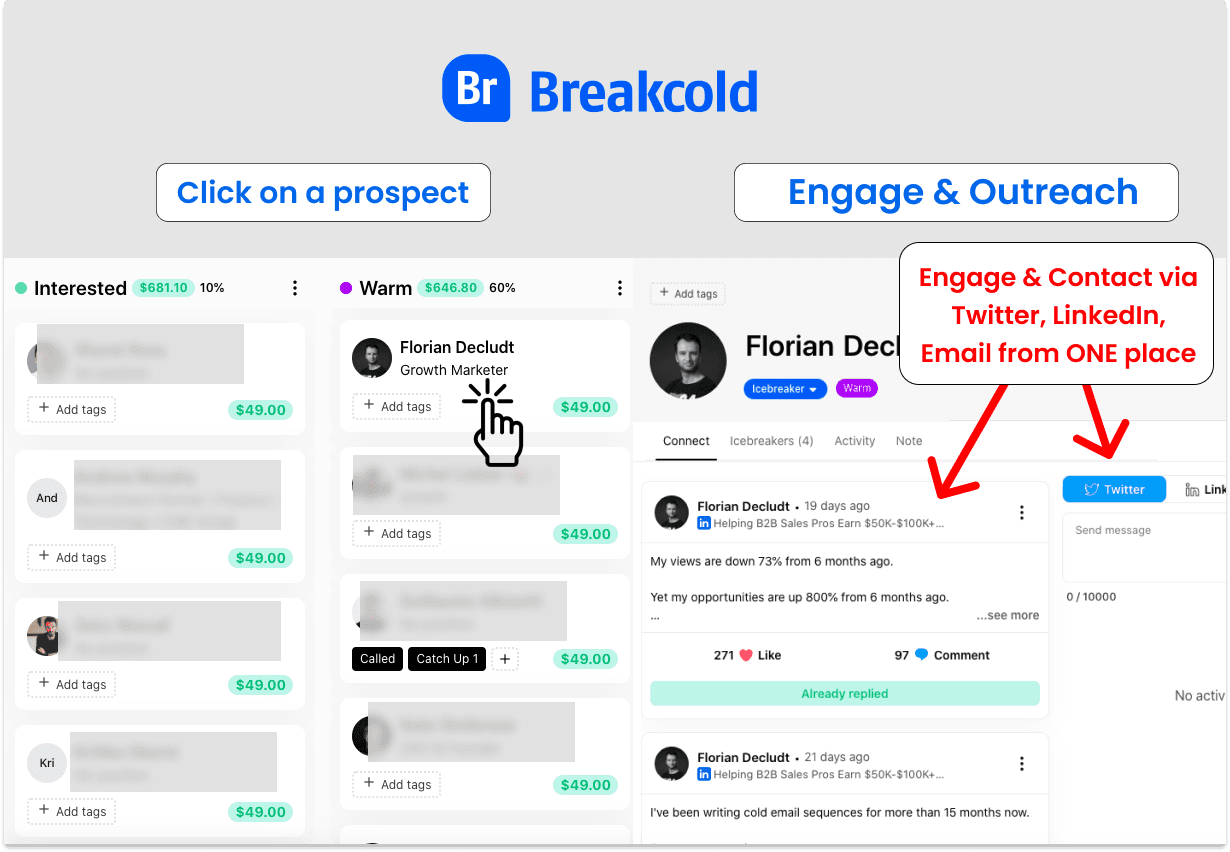
Breakcold helps both Hunter and Farmers to get amazing sales prospecting results
2°) Advantages and Disadvantages of Hunter vs Farmer sales: which one has the best ROI?
Advantages & disadvantages of the Hunter sales methodology
Avantages of Hunter sales
The advantage of the Hunter sales method is that you will never run out of leads. It's a big advantage for any business that want to grow.
Another advantage is that prospecting techniques for sales are not expensive these days and you can automate many repetitive tasks.
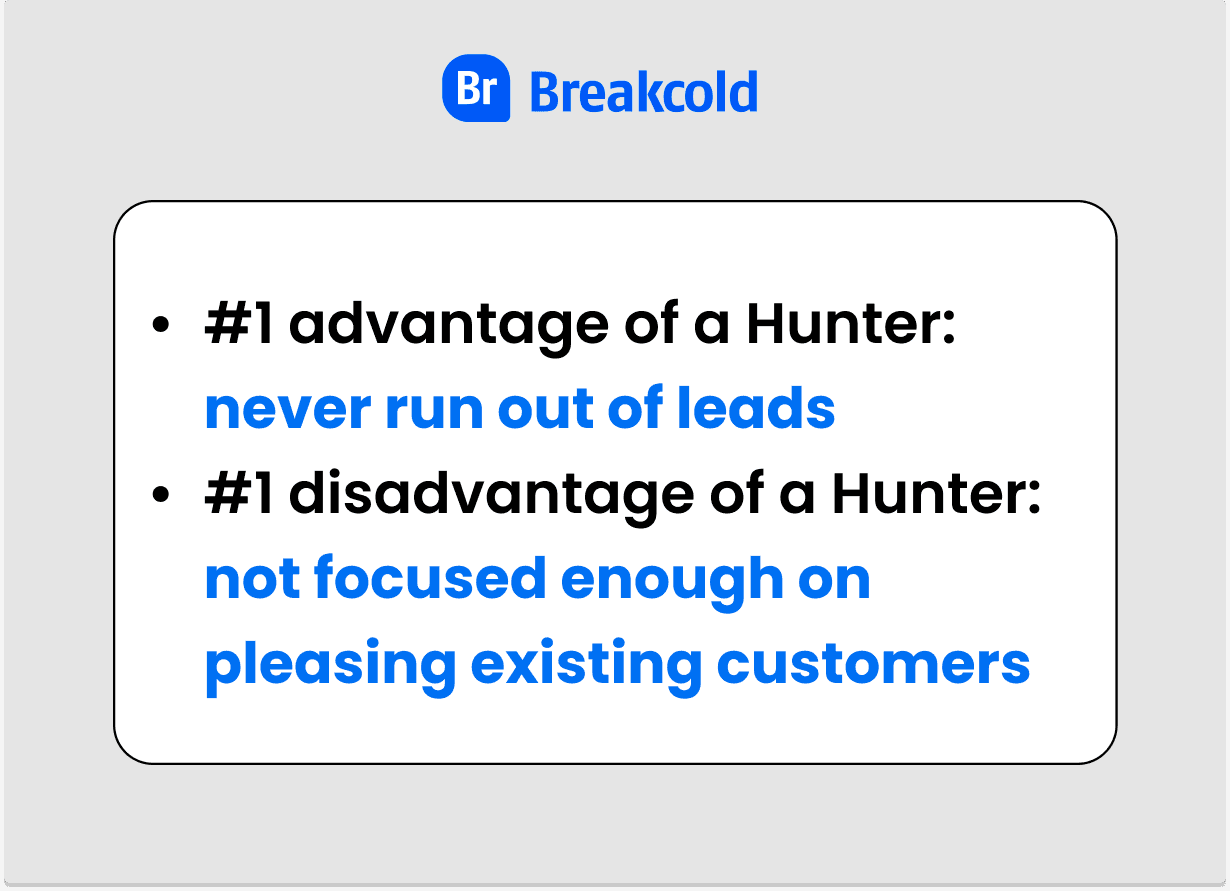
Main advantage and disadvantage of a Hunter
Disadvantages of Hunter sales
The first disadvantage of Hunter sales is that you're always looking for new leads to generate. If you're only adopting this sales model, it's really dangerous.
Sometimes your product or service doesn't satisfy your current users but you're still chasing new potential customers, you basically do useless efforts.
Another disadvantage of the Hunter sales mindset is that you don't generate enough quality leads. Lead generation techniques in the Hunter sales model are often agressive techniques where you cold emails, cold calls and/or social media outreach are generic and not relevant.
In the end, you can also end up generating leads that are not qualified enough because Hunters don't segment their prospecting lists enough.
Advantages & disadvantages of the Farmer sales methodology
Avantages of Farmer sales
The first advantage of the Farmer sales model is that you focus on what you already have: existing clients and warm prospects.
Salesforce and Hubspot, the biggest sales softwares in the world with an army of more than 100,000 sales employees have grown every year by mainly focusing on existing customers.
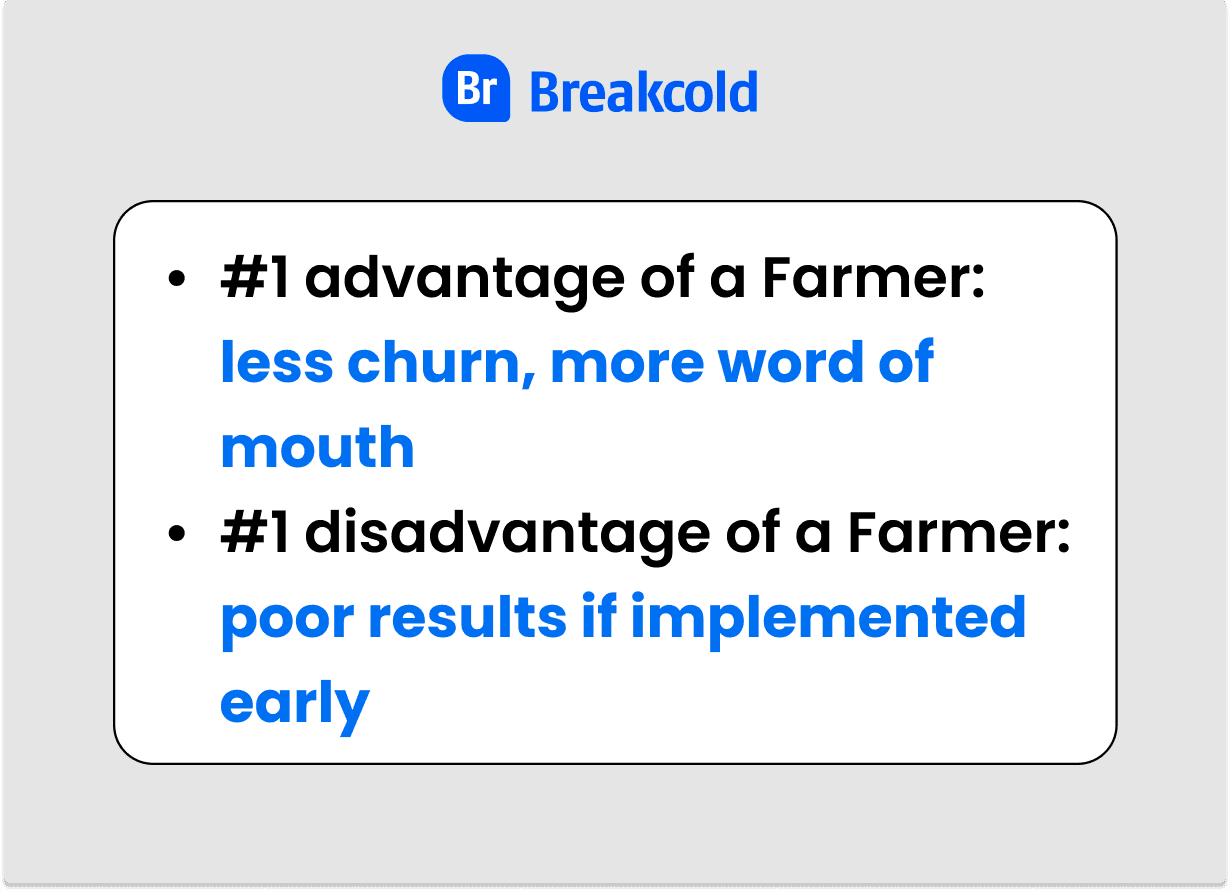
Main advantage and disadvantage of a Farmer
Focusing on current customers leads to:
less churn
more customer satisfaction
more feedback from customers to improve the product or service
revenue expansion
word of mouth so new customers
All of that without loosing energy into generating new leads with a Hunter sales model.
Disadvantages of Farmer sales
The first disadvantage of the Farmer Sales model is that if you don't have many existing clients or warm prospects to start with, you'll have poor results.
Another disadvantage is if you have a really low paying offer, for example under $25 per month. With a Hunter sales model you can focus on generating as many leads as possible while with a Farmer model you won't make a lot of revenue.
Conclusion: Farmer Sales has the best ROI
Whatever the price of your offer, what matter in sales is that the customer is happy so he/she can recommend your product or service. Word of mouth is by far the best method to grow sales and only the Farmer sales method can grant you such a result, not the Hunter one.
Example of a ROI with a Farmer sales model
Disclaimer: all these examples are oversimplified to make things understandable
Imagine the following:
30 existing customers at a $2,500 per month offer ($75,000 per month)
5 warm prospects for the same offer
3 Account Executives to handle all the clients and prospects ($240,000 per year so $20,000 per month).
Let's assume that thanks to the Farmer sales model, 4 out of of 5 deals are closed and that because of the extreme care on existing customers, each of them bring 1 new client thanks to word of mouth.
It means that the business went from $75,000 per month to $160,000 per month. It means the ROI of the Farmer sales model is 4.25 (for $1 spent, $4,25 dollars would be generated).
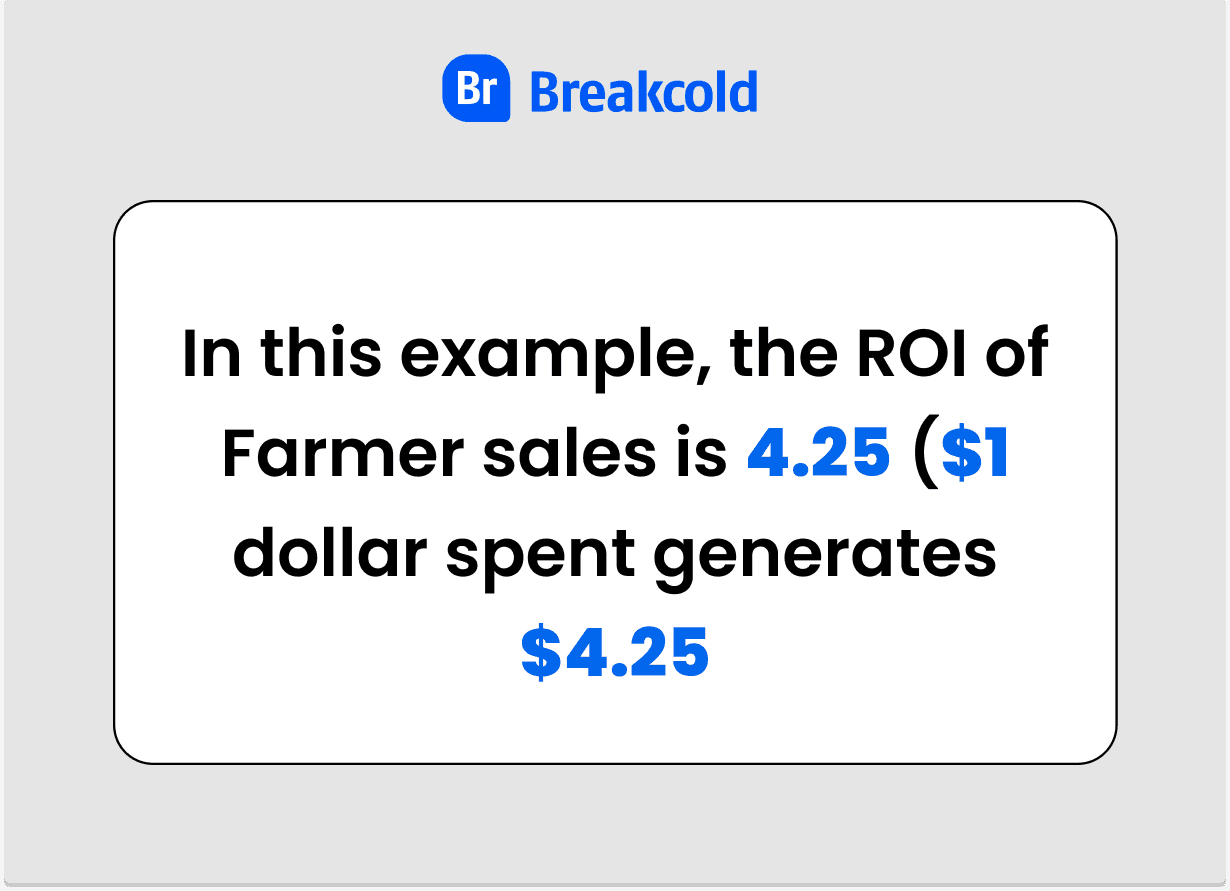
Example of the Farmer sales model ROI
Let's see the difference with the Hunter sales model which a similar head start.
Example of a ROI with a Hunter sales model
Disclaimer: all these examples are oversimplified to make things understandable
Let's take almost the same data as above, imagine the following:
30 existing customers at a $2,500 per month offer ($75,000 per month)
5 warm prospects for the same offer
1 Account Executives to handle all the clients and warm prospects ($80,000 per year so $6,666 per month).
2 Sales Development Representatives to generate new leads ($120,000 per year so $10,000 per month)
20 leads are generated in the same month
Let's assume that thanks to the Hunter sales model, 7 out of 20 deals are closed and that because of the lack of care on existing customers, there are no new word of mouth clients.
It means that the business went from $75,000 per month to $92,500 per month. It means the ROI of the Farmer sales model is 0.875 (for $1 spent, $0,875 dollars would be generated). Here the ROI is negative but let's not forget that it has been calculated on the new money earned and doesn't take into account the money that was already generated by the business.
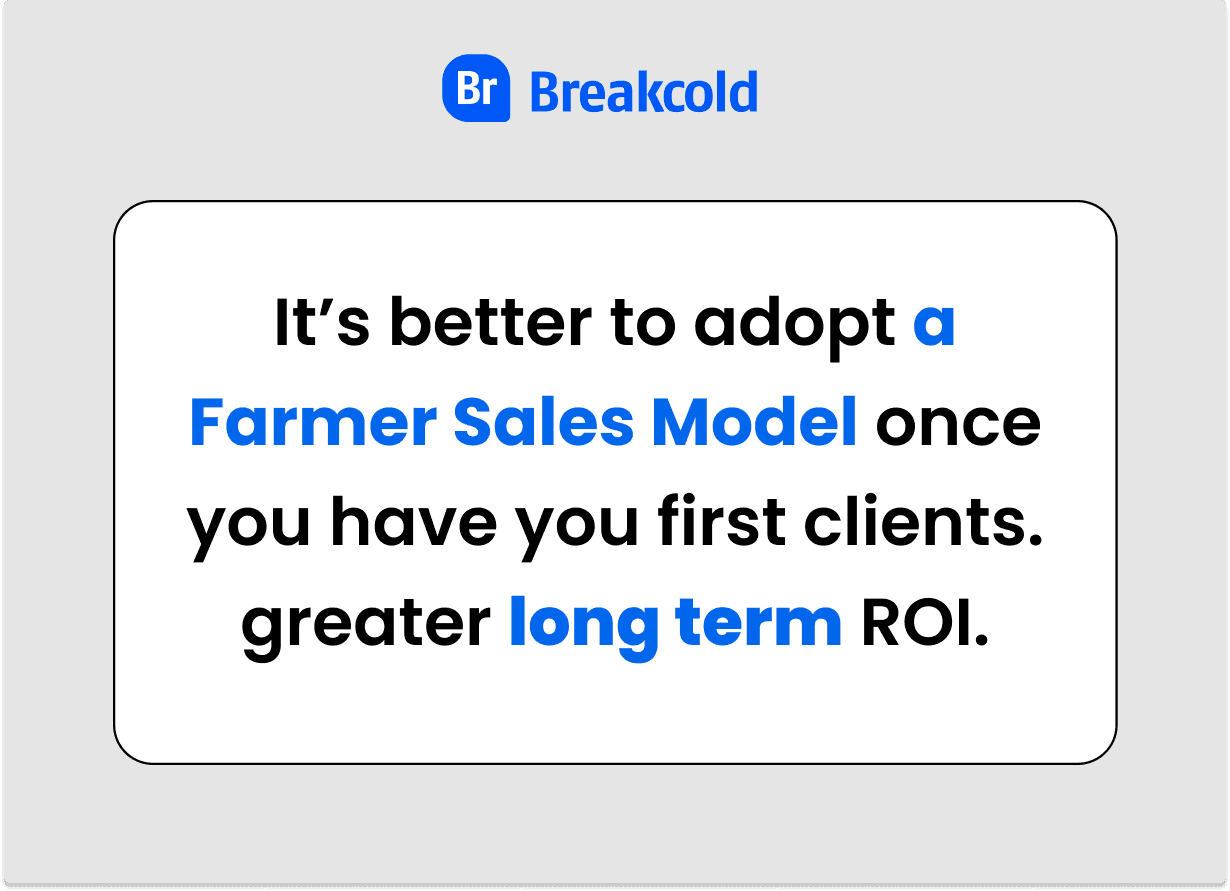
It’s better to adopt a Farmer sales model
Consequently, the Farmer sales model yields the best ROI (Return On Investment) but in the end, the best method is to make Hunters and Farmers work together.
3°) How can Hunters and Farmers work together?
The lead generation phase
Sales Pipeline Stage 1: Prospecting
At the prospecting stage, Farmers need to teach Hunters what is the ideal customer profile of the company.
Farmers know better than Hunters what kind of prospects close the best, so their role is to teach Hunter to hunt for the right prospects.
The Hunters need to do what they do best: prospecting.
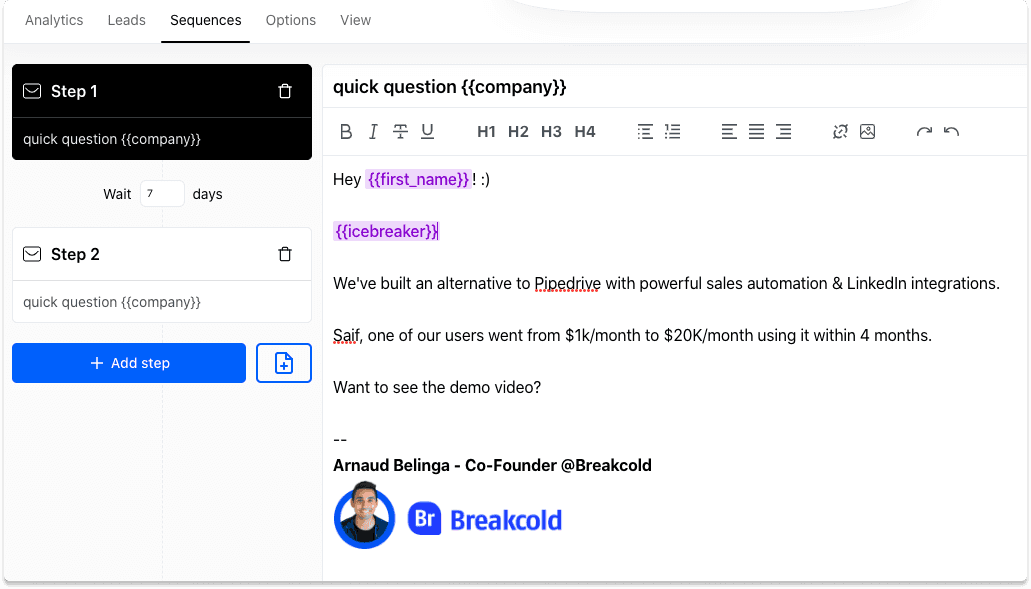
Example of a cold emailing software with Breakcold
Sales Pipeline Stage 2: Lead Qualification
During the lead qualification stage, Farmers should guide Hunters to make sure that the leads generated are indeed close to the persona the identified together.
Depending on this assessment, the qualified leads should become opportunities in the sales pipeline of Farmers.
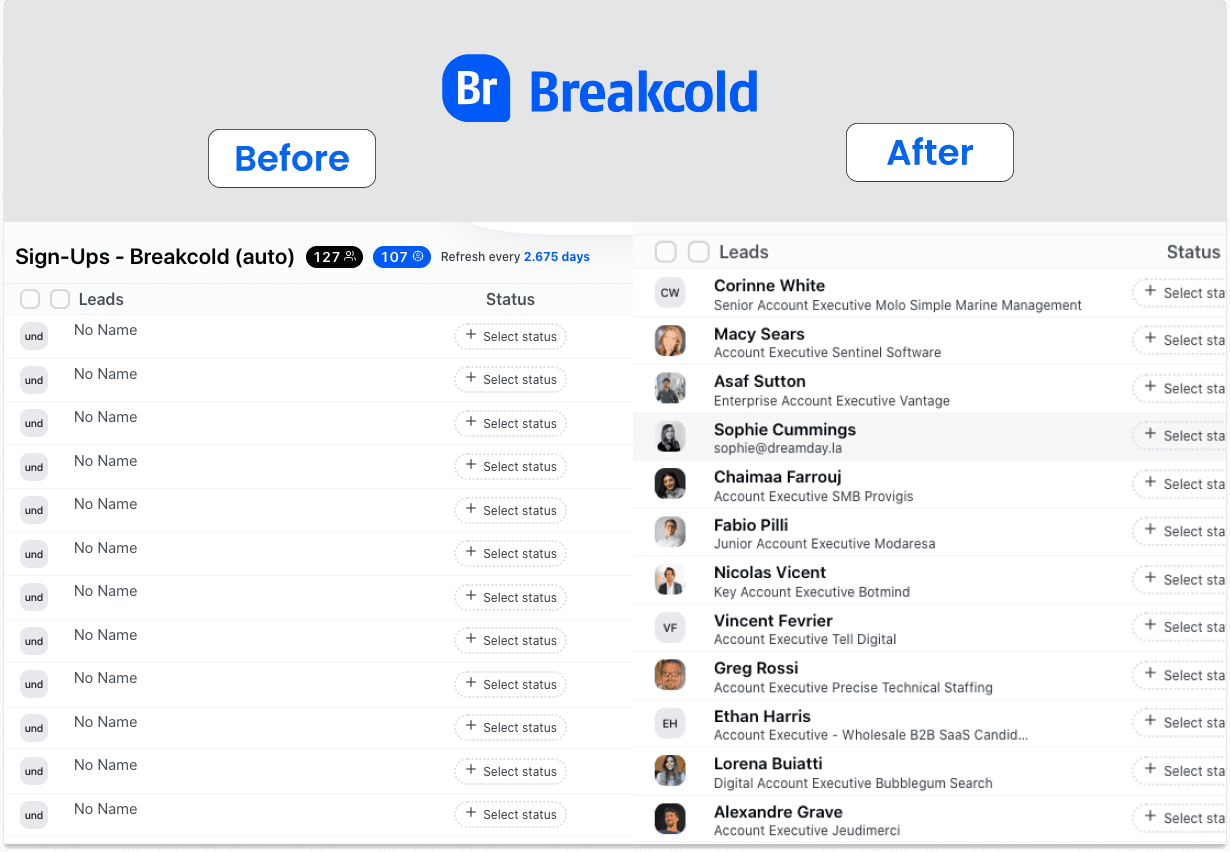
Example of a qualification process of leads by enriching contact informations
Sales Pipeline Stage 3: Demo or Meeting
Hunters or Farmers can both handling this phase, depending on the deal size, Hunters will take care for the smaller deals.
The negotiation phase
During this phase, Hunters are out of the equation and Farmers handle the back-and-forth discussions with the potential clients.
Sales Pipeline Stage 4: the proposal
During this phase, Farmers should speak with Hunters to share knowledge and feelings about the client in order to come up with the right wording and proposal.
Hunters might have noticed things that Farmers didn't and vice-versa.
Sales Pipeline Stage 5: negotiation and commitment
During this stage, the Farmer is handling the situation without the help of the Hunter.
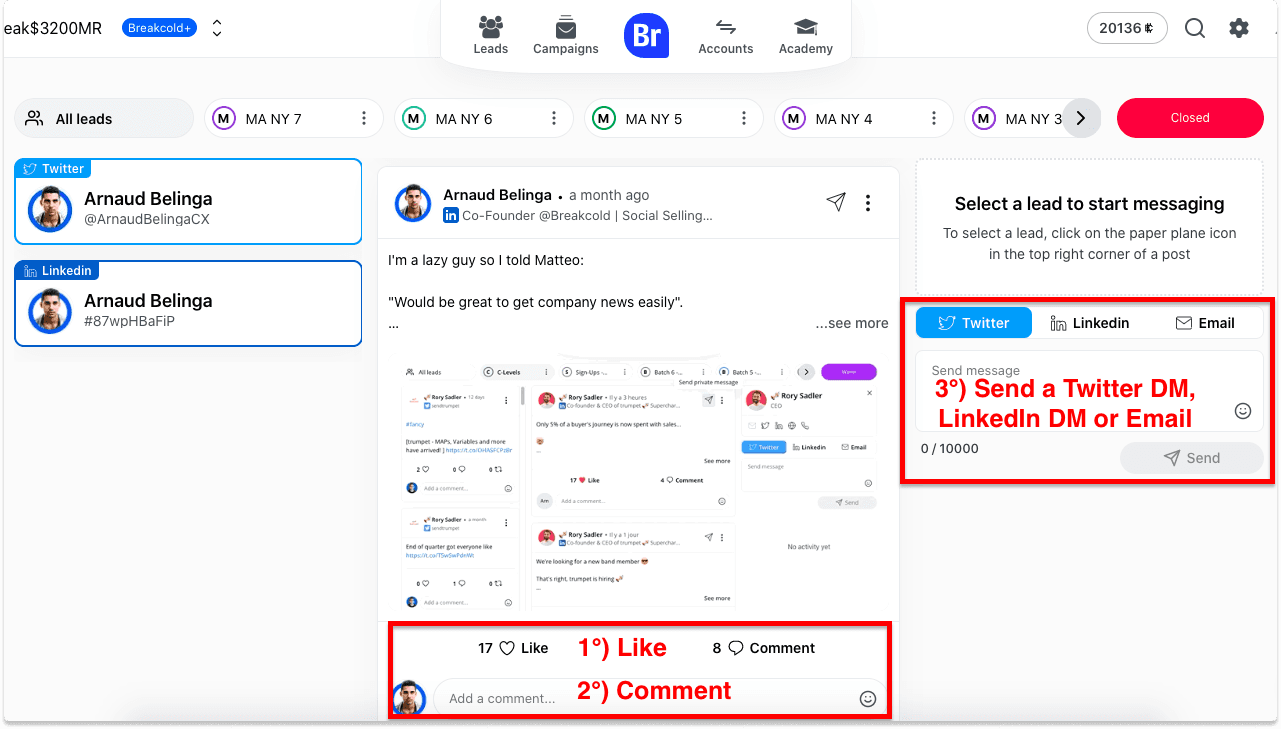
During this sales pipeline stage, it's important to engage with prospects daily
The retention phase
Sales Pipeline Stage 6: Opportunity won
Both Farmers and Hunters can celebrate for their common victory.
Sales Pipeline Stage 7: Post-purchase
Farmers need to make the existing clients satisfied. At this stage, Hunters are already working on new leads.
Sales Pipeline Stage 8: Word of mouth
Farmers should teach Hunters what exceptional results had the clients in order for them to craft a new sales copy with client testimonials.
This will help Farmers to have better cold email open rates and reply rates so they will generate more leads for the sales team.
4°) Should you choose the Hunter or the Sales Model for your business?
Let's assume here that you just started your business, it could be a software startup or a digital marketing agency.
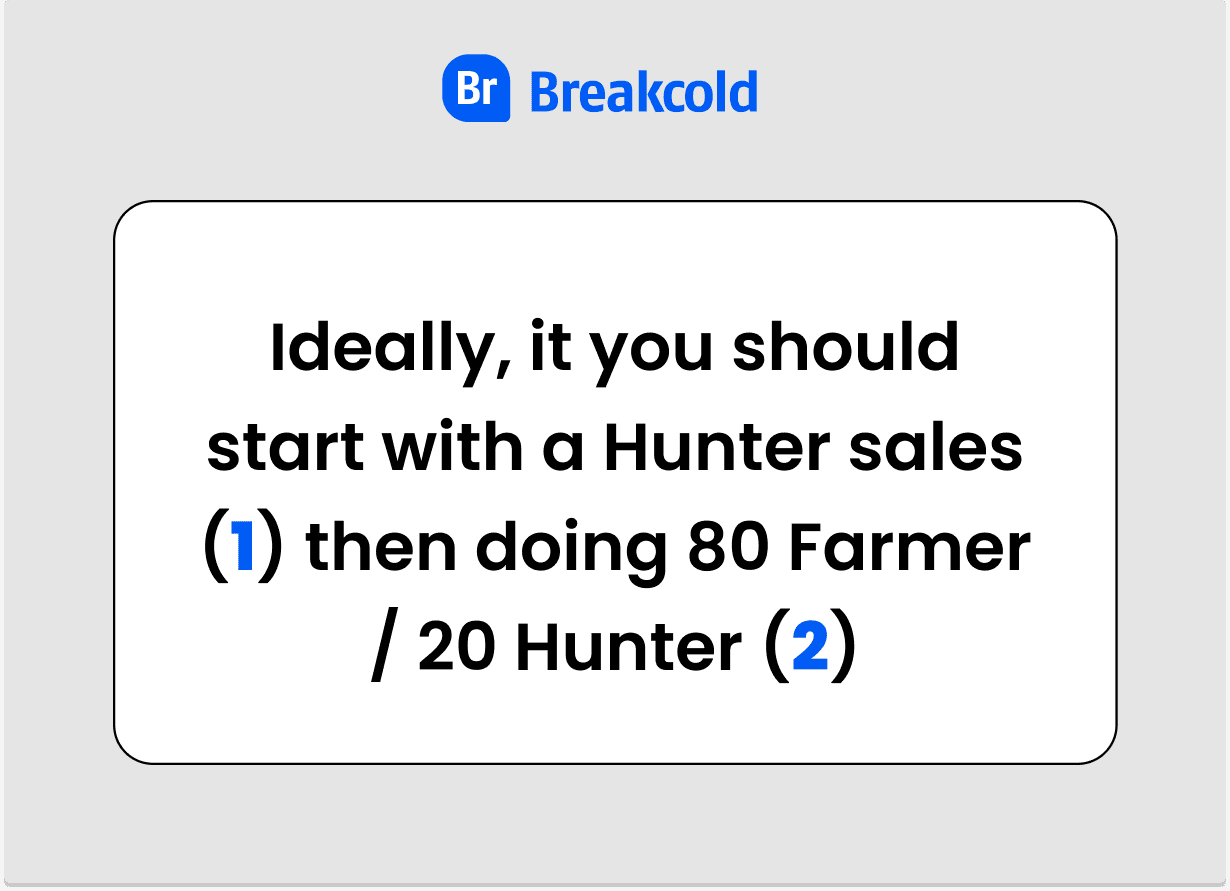
Ideally, you should start with Hunter sales, then doing 80 Farmer / 20 Hunter
if you're starting your business, you should adopt a Hunter sales model. Your product or service won't sell itself automatically. However, once you have enough clients, focus on making them successful and start to progressively adopt a Farmer sales model.
Once you master the Farmer sales model, readopt an hybrid approach by combining the Hunter & Farmer sales so you can have the best of both worlds.
In short:
hunter sales to kickstart the business
farmer sales to create super fans of your business that will sell your business for you (word of mouth)
scale the business by bringing new leads with hunter sales and creating super fans with farmer sales
5°) Is there a difference in the compensation model?
Because of the nature of both models, there is a difference in the compensation model.
Depending on the organization, some Hunters will get their bonuses depending on how much they fill the sales pipeline with enough qualified leads.
On the other hand, Farmers will have some bonuses depending on how many licences they renew for examples while also expanding the existing revenue.















































































































































































